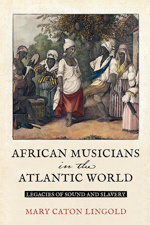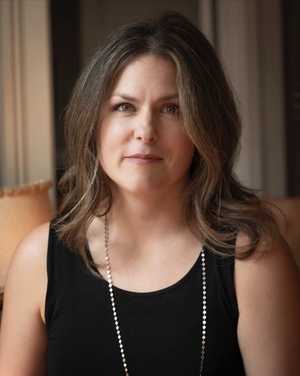Today, we are happy to bring you our conversation with Mary Caton Lingold, author of African Musicians in the Atlantic World: Legacies of Sound and Slavery.
What inspired you to write this book?
My background as a white US Southerner made me want to understand the world that I came from, which was so defined by race and racism. That sent me on a path to graduate school to study the literature and culture of the Atlantic world and the rise of slavery in the Caribbean. I am also a musician and around the same time I was learning about the history of slavery I was transitioning from classical music to Americana genres, and I took up bluegrass fiddling. A lot of people may know about the African roots of the banjo, an instrument that is iconic within the genre. But as I was learning to fiddle, I realized that a lot of bluegrass music is built on Black musical traditions – the blues scale, gospel repertoire, and the formal structure of virtuosic soloing that comes right from jazz. I started to grow very curious about the history of Black music and how many of these histories have been silenced, especially through white performance. That led me to notice how much information about musical life is embedded in narrative records about slavery, such as travel accounts. Eventually, I came to appreciate the magnitude of the impact of enslaved musicians in their own moment and on the modern world more broadly. I wanted to understand how and why musicians practiced music under slavery and how they built such a massively influential set of traditions under duress.
What did you learn and what are you hoping readers will learn from your book?
I learned that music was central to the lives of Africans living under slavery. And that music was really important not only to their experiences, but also to the development of the cultures of the Atlantic world and broader Americas. I also learned to think about the fact that musical life under slavery wasn’t an accident of history, it was something that enslaved communities purposely created and established as central to their world.
What surprised you the most in the process of writing your book?
I was surprised to find that distinctive African musical traditions continued to be practiced to a remarkable degree in the Americas even after slavery had become a well-established practice. I expected these traditions to be quickly replaced by Afro-American arts. But, because Africans continued to be trafficked from Africa to America, their national traditions continued to be present in slave societies into the late-eighteenth century.
I was also surprised to find that Europeans, who wrote a lot of the records that we have of African Atlantic music, actually liked a lot of what they heard in Africa in the early modern period. They wrote favorably about military and court music, especially. But, when Europeans described similar music performed in the context of slavery they were much more derisive and racializing, and they feared instruments associated with martial and monarchic practice, especially.
What’s your favorite anecdote from your book?
Probably my favorite stories are the ones that I have discussed and shared with others outside the context of the book. Performance and collaboration fuels my research and writing.
I created a podcast about an enslaved woman named Tena who lived in Georgia in the 1820s, and sang a song to children in her care. Her song was published in a book of folksongs in 1927 and later was written about in South Africa. Her story became part the book’s epilogue, wherein I step outside the frame and consider the legacies of the music and lives at the heart of the book.
I also co-created a website that tells the story of a much earlier musical source, from the late 1680s, when a man named Mr. Baptiste transcribed performances by enslaved Africans living in Jamaica. This music is some of the earliest notated records of African and African-diasporic music that we have. Baptiste’s notation, which was published in Hans Sloane’s 1707 natural historical tome and travelogue of Jamaica, have inspired many contemporary re-imaginings of the music, and I have been fortunate to learn from musicians in Jamaica and elsewhere about new ways to interpret the historic source through performance.
What’s next?
I am working on some personal essays that explore race, class, and gender in the rural U.S. South. I’m also working with collaborators on an edited anthology that gathers early manuscript notated sources of Black music and makes them more accessible to performers, scholars, and music educators. I just took the helm of an interdisciplinary PhD Program in Media, Art, and Text at VCU where I teach and I am looking forward to growing the profile of the program and working to transition humanities doctoral education for the evolving state of higher education today.





